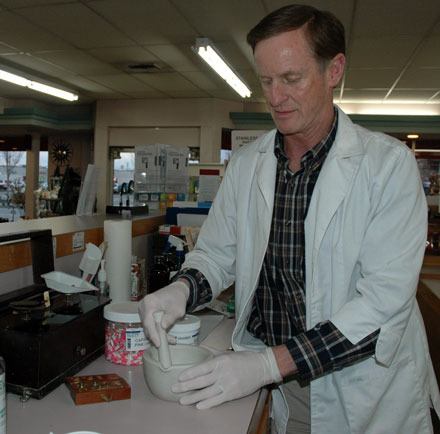MARYSVILLE — “Just this Monday, one of our customers came to us crying,” said Mary Kirkland, owner of Hilton’s Pharmacy in Marysville, on Thursday, Jan. 12. “Because of the PBMs, her insurance told her that she had to go to mail-order for her medication, but she didn’t want to leave us. She’s a cancer patient who requires a lot of medication, which has to be filled right away, but all the mail-order pharmacies fill them from out of state.”
Many people have never heard of Pharmacy Benefit Managers, or PBMs, but according to not only Kirkland, but also Arlington Pharmacy General Manager Cory Duskin and state Rep. Kirk Pearson, the PBMs’ decisions can impact the quality of prescription drugs and pharmacy services that pharmacy customers receive, as well as the prices they pay for them.
Talking with Duskin about PBMs inspired Pearson to draft a piece of legislation that they and Kirkland hope will help provide less expensive and more attentive health care for pharmacy patients throughout the state.
“I’m always getting different ideas from my constituents, but this one hit close to home,” Pearson said. “When my father passed away, I remembered how wonderful his local pharmacy was in going above and beyond the call of duty for him. Local pharmacies aren’t just places to buy drugs. They develop real relationships with their customers.”
Pearson explained that PBMs manage prescription drug benefits for a variety of health plans, and receive rebates and discounts from pharmaceutical manufacturers for promoting their products, which favors more expensive brand drugs over cost-effective generics.
Both Pearson and Duskin expressed concerns about the fact that PBMs are the only health care profession that’s unregulated within Washington state, and pointed to the 23 other states that have adopted legislation similar to House Bill 2303, which was introduced on the floor Jan. 11 with Republican Pearson as its primary sponsor and two Democratic representatives cosponsoring it. Duskin took particular exception to the number of PBMs that drive traffic toward “preferred” pharmacies and their own mail-order pharmacies, with Kirkland citing the health care value of the personal touch.
“We have a couple of widows who are on Medicare Part D,” Hilton said. “They have questions about how to submit their paperwork, but mail-order isn’t going to give them one-on-one contact with professionals who can provide those answers. The staff of a community pharmacy like ours greets the customers and knows their names, and as we’re filling their prescriptions we talk to them at the counter about what these medicines actually are and what their side effects are. Because we have consistent contact with them we can tell if they’ve lost weight, if they’re confused or if they’re having trouble ambulating, and we can call their doctors to let them know.”
Hilton doesn’t object to mail-order pharmacies being offered as an option to patients, but she criticized PBMs for mandating such mail order services to many patients, through both explicit and implicit means.
With reimbursements to health care providers going down while premiums go up, Hilton joined Duskin in calling for oversight to ensure that PBMs aren’t pocketing the difference.
“We need transparency, but we don’t need to create any new agencies,” Duskin said. “This is not growing government or increasing government spending. All the enforcement procedures are already on the books.”
“We don’t want to eliminate PBMs,” said Pearson, who added that the state Senate has a companion bill to House Bill 2303, which has also received bipartisan sponsorship. “This legislation simply seeks to create a level playing field. As much as I deal with public safety issues, I wouldn’t be doing this if I didn’t think it was an important piece of legislation. I can’t tell you the prices will go down immediately, but it should make the market more fair and afford people more choices.”



